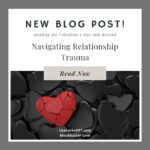As Valentine’s Day approaches, the air fills with love and affection. However, for many individuals, this time of year can be a painful reminder of past relationship trauma or current relationship distress. Whether stemming from heartbreak, betrayal, or abuse, the scars of such experiences can linger, affecting one’s ability to trust, love, and connect with others. In this blog post, we delve into the complexities of relationship trauma, explore its impact, and discuss strategies for healing, just in time to show yourself some love for Valentine’s Day.
Understanding Relationship Trauma: Relationship trauma encompasses a broad range of experiences that leave lasting emotional wounds. It can result from various forms of mistreatment, including infidelity, abandonment, emotional neglect, or even physical or verbal abuse. Such traumas can profoundly impact an individual’s sense of self-worth, security, and ability to form healthy relationships in the future.
Impact of Relationship Trauma: The effects of relationship trauma can be far-reaching, manifesting in a myriad of ways. Some individuals may struggle with trust issues, constantly fearing betrayal or abandonment by their partners. Others may experience difficulty in expressing their emotions or forming intimate connections, keeping others at arm’s length to avoid further hurt. Additionally, unresolved trauma can contribute to anxiety, depression, and other mental health challenges, further complicating one’s ability to engage in fulfilling relationships.
Healing from Relationship Trauma: While the road to healing from relationship trauma may be long and challenging, it is possible with patience, self-compassion, and support. Here are some strategies to consider:
- Therapy: Seeking guidance from a qualified therapist can provide a safe space to process past experiences, explore underlying emotions, and learn healthy coping mechanisms.
- Self-care: Prioritize self-care activities that nurture your physical, emotional, and mental well-being. This may include exercise, meditation, journaling, or engaging in hobbies that bring joy and fulfillment.
- Establish boundaries: Learn to identify and assert healthy boundaries in your relationships, setting clear expectations for how you deserve to be treated and what behavior is unacceptable.
- Practice forgiveness: While forgiveness does not mean excusing or forgetting past wrongs, it can free you from the burden of carrying resentment and anger. Forgiving others, and yourself is a crucial step towards releasing the grip of relationship trauma.
- Cultivate self-love: Focus on building a positive relationship with yourself, embracing your strengths, flaws, and worthiness of love and happiness.
Valentine’s Day and Healing: As Valentine’s Day approaches, those healing from relationship trauma may feel a mix of emotions – longing for love, dread of past pain, or perhaps indifference towards the holiday altogether. Regardless of where you fall on this spectrum, remember that Valentine’s Day is just a day. And like any other day, it’s what you make it and can serve as an opportunity for self-reflection, growth, and self-love.
Instead of focusing solely on romantic gestures or external validation, use this time to honor your journey toward healing and self-discovery. Treat yourself with kindness and compassion, celebrate your progress, and surround yourself with supportive loved ones who uplift and affirm your worth.
Although relationship trauma can cast a long shadow over one’s life, affecting relationships and overall well-being, please know that with time, effort, and support, healing is possible. As Valentine’s Day approaches, take this opportunity to prioritize your healing journey, cultivate self-love, and embrace the possibility of healthier, more fulfilling relationships in the future. Remember, you are deserving of love, respect, and happiness, on Valentine’s Day and every day.
